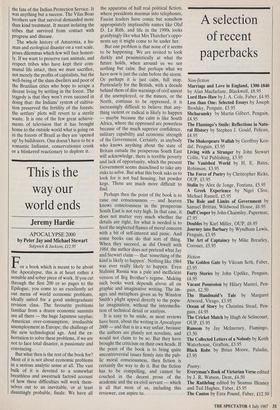This is the way our world ends
Jeremy Hardie
APOCALYPSE 2000 by Peter Jay and Michael Stewart Sidgwick & Jackson, £12.95 For a book which is meant to be about the Apocalypse, this is at heart rather a sensible and sober piece of work. If you cut through the first 200 or so pages to the Epilogue, you come to an excellently set out menu of world economic problems, ideally suited for a good undergraduate revision class. The favourite problems familiar from a dozen economic summits are all there — the huge Japanese surplus; American over-consumption; irreducible unemployment in Europe; the challenge of the new technological age. And the ex- hortation to solve these problems, if we are not to face total disaster, is passionate and convincing.
But what then is the rest of the book for? Most of it is not about economic problems in a serious analytic sense at all. The vast bulk of it is devoted to a somewhat breathless and awestruck factoid account of how these difficulties will work them- selves out to an inevitable, or at least dauntingly probable, finale. We have all the apparatus of half real political fiction, where presidents murmur into telephones, Fascist leaders have comic but somehow appropriately implausible names like Olaf D. Le Rith, and life in the 1990s looks gratifyingly like what Mrs Thatcher's oppo- nents say it might come to be under her.
But one problem is that none of it seems to be happening. We are invited to look darkly and pessimistically at what the future holds, when around us we see nothing but calm. But perhaps what we have now is just the calm before the storm. Or perhaps it is just calm, full stop. Particularly for the British, with a decade behind them of dire warnings of civil unrest if the unemployed, or the miners, or the North, continue to be oppressed, it is increasingly difficult to believe that any- thing violent or radical is likely to happen — maybe because the calm is like South Africa, where the oppressed are powerless because of the much superior confidence, military capability and economic strength of the Government. Certainly, as anybody who knows anything about the state of Britain outside the prosperous South East will acknowledge, there is terrible poverty and lack of opportunity, which the present Government seems disinclined to take any risks to solve. But what this book asks us to look for is not bad housing, but powder kegs. Those are much more difficult to find.
Perhaps then the point of the book is to raise our consciousness — and heaven knows consciousness in the prosperous South East is not very high. In that case, it does not matter very much whether the details are right, for what is needed is to feed the neglected flames of moral concern with a bit of self-interest and panic. And some books can do that sort of thing. When they succeed, as did Orwell with 1984, the author does not pretend what Jay and Stewart claim — that 'something of the kind is likely to happen'. Nothing like 1984 was ever really likely to happen. Even Stalinist Russia was a pale and inefficient version of Big Brother's regime. Making such books work depends above all on graphic and imaginative writing. The im- ages and metaphors given us by Winston Smith's plight appeal directly to the popu- lar imagination, without the intermedia- tion of technical detail or analysis.
It is easy to be snide, as most reviews have been, about the writing in Apocalypse 2000 — and that is in a way unfair, because the authors are plainly not novelists, and would not claim to be so. But they have brought the criticism on their own heads. If the point of the book is to bring quite uncontroversial issues firmly into the pub- lic moral consciousness, then fiction is certainly the way to do it. But the fiction has to be compelling, and cannot be couched in the decent prose of the academic and the ex-civil servant — which is all that most of us, including this reviewer, can aspire to.


















































 Previous page
Previous page